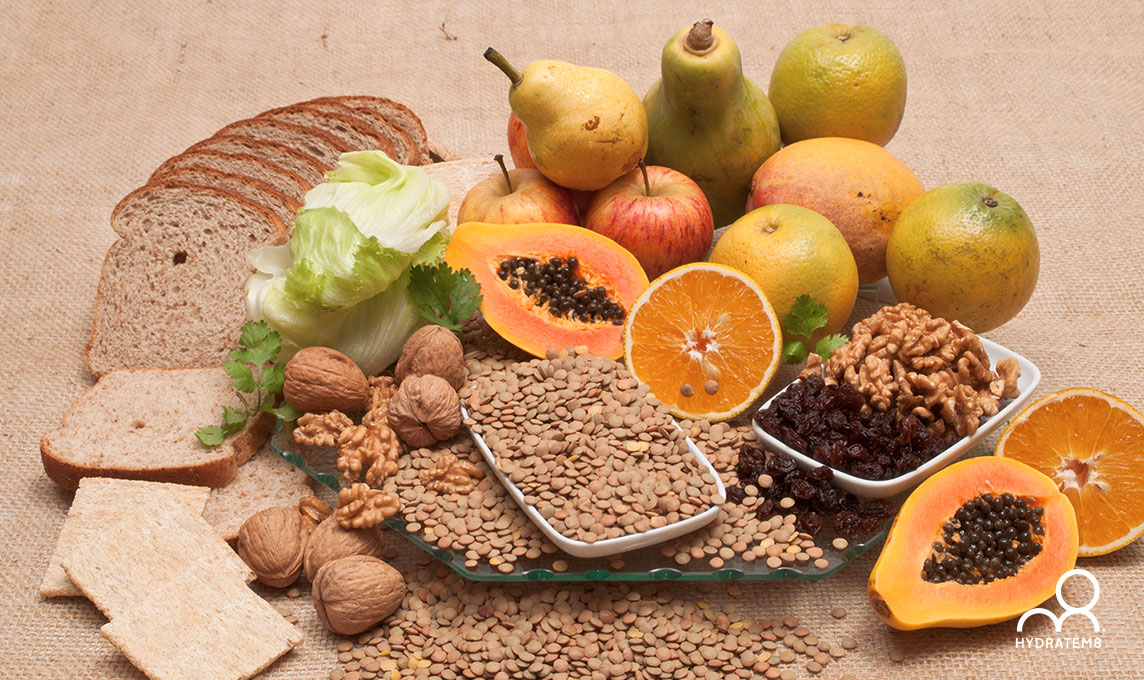The importance of water to the human body as a hydrant is common knowledge, but are you aware of just how key it can be to aid the digestion? Fibre, in particular, passes through the body’s tract significantly easier with the assistance of cool, refreshing H2O.
The Bluffers Guide to Fibre
This complex carbohydrate is not automatically broken down by the body and passed through the digestive system, hence why it is a firm favourite of dieters; feeling full on zero-calorie food intake can only be a good thing. Nevertheless, fibre requires the assistance of water to be absorbed by the body or it would sit heavily within our stomachs for far longer than is healthy. The impact of these fluids depends on whether these fibres are soluble or insoluble.
What is Soluble Fibre?
Most abundantly sourced in fresh fruit, green vegetables and grains such as oatmeal, soluble fibres (also referred to as roughage) dissolve in water as the name suggests, resulting in the formation of a sticky fluid within the stomach lining. This may not sound attractive, but it’s actually doing you the world of good; this substance attracts unwelcome cholesterol particles and drags them away from your heart, lowering your risk of heart disease. This combination also helps keep your digestive tract healthy, as the soluble fibres slow down the passage of water from mouth to bowels via the small intestine.
What is Insoluble Fibre?
Insoluble Fibre is every bit as key to the body as its soluble counterpart and, while it reacts differently to water, it is equally essential that you stay hydrated when consuming this foodstuff. Typically found in seeds, wholemeal bread and rice, insoluble fibre does not break down, no matter how much we consume or how many glasses of water we willingly throw down for adequate hydration. However, these are the fibres that help keep us regular, and water will keep the process steady. Perhaps more importantly, soluble fibres act as a broom for the insides – they clean up any toxins around the digestive system as they pass through our bodies and aid in dispelling dangerous substances from your body. As water often performs the same task, remaining hydrated will keep your body even healthier as well as leaving you feeling full and sated without bloating.
Will Fibre Impact My Water Intake?
Most fibre supplements will be of the soluble variety thanks to these health benefits, whilst many foods enjoy a ratio of 75:25 in favour of insoluble. To this end, if you’re going to increase your intake of this particular carbohydrate you’ll also be able to make sure you’re consuming plenty of water – failing to do so leaves you at risk of not only indigestion, but cramps and gas pains. It’s always advisable to drink at least 8 servings of water per day, and that is particularly important if you’re getting your recommended intake of the rough stuff.
Are There Dangers to High-Fibre Diets?
Only if you live with a medical condition that leaves you at risk of fluid overload, or another existing complaint such as IBS. It cannot be stressed how important it is to drink plenty of water to gain the benefit from consuming fibre (the aforementioned eight glasses per day is a minimum recommendation), and you should seriously look into replacing some of your other beverage choices, such as caffeinated hot drinks and fizzy pop, with clear fluids to avoid any adverse reactions. When you drink water, is as important as how much you drink, particularly if you are following a high fibre diet – sipping regularly throughout the day should ensure the smooth passage of fibre through your system, as it collects all the ‘nasties’ on its journey..
With fibre and water both hugely important elements of any daily diet, there is nothing to lose and everything to gain by ensuring that these complementary foods and fluids are a regular part of your diet.

